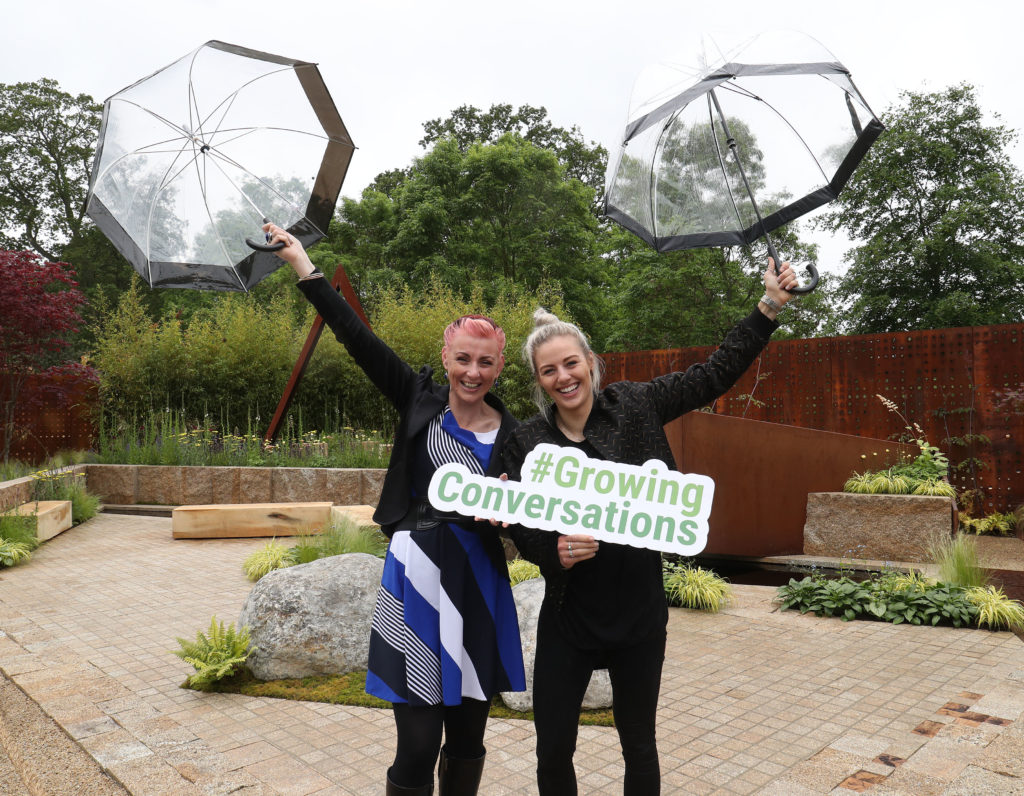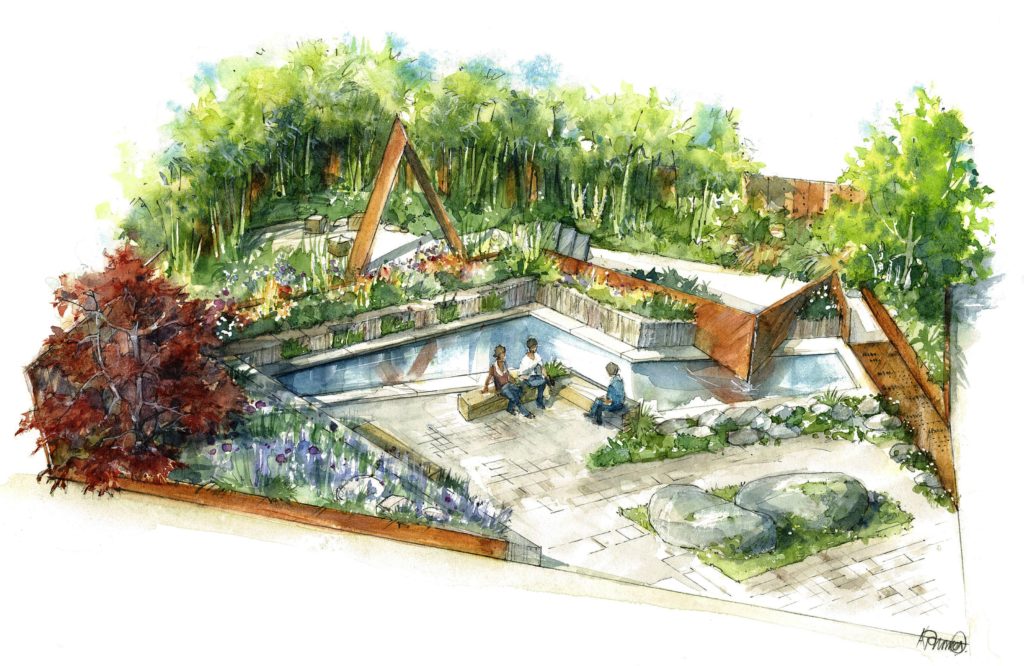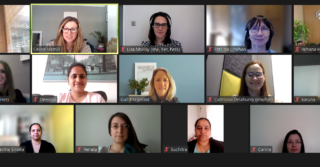Show garden created in collaboration with people impacted by mental illness unveiled at Bloom in the Park 2019
Grounded’ sponsored by Janssen in association with Aware and See Change, aims to grow the conversation around mental illness
With the mission of starting a national conversation around mental illness, Janssen in partnership with leading mental health organisations Aware and See Change, are presenting a one-of-a-kind garden at Bloom in the Park 2019. The garden called ‘Grounded’ has been designed by landscape architect Maeve O’Neill in collaboration with people living with or affected by mental illness.
A series of workshops were held in Dublin’s Botanic Gardens bringing together people with experience of, or that have been impacted by, a wide range of mental illnesses. Through these workshops the participants were able to translate the reality of living with mental health difficulties into the design of the garden. Inspiration from the garden comes from the idea that a conversation is the first step on the journey to recovery, and highlights how connecting to nature is really rewarding and has real life health benefits.
New research conducted in 2019 shows that almost 4 in 10 adults in Ireland claim to have experienced or been diagnosed with a mental illness.1 Within this, a quarter (25%) claim they have been diagnosed with anxiety, 22% with mild depression and 12% with panic attacks. Despite this, awareness of the signs and symptoms, as well as the nature of the individual conditions, remains low among the general public
Maeve O’Neill, landscape architect said, “The initial concept for the garden design grew from the concept of “Grounding”, and the effect that walking barefoot through grass can have on a person’s mental wellbeing. It incorporates ideas and drawings that were conceived through a series of hands-on workshops with people living with or affected by a variety of mental illnesses. Working with advocates from both Aware and See Change injected authenticity into the garden, evolving its design to more truly reflect the experience of living with a mental illness: the dark times associated with isolation, stress and pain, and the lighter times associated with strength, resilience and finding a way to live well with the illness.
Commenting on the creative process through which the design evolved, workshop participant and See Change ambassador Nick Groom said, “It’s important that we move away from the sanitised public perception of mental health and mental illness. The reality is that living with a mental illness is hard. I’ve had days where I can see the sun, but I can’t feel the sun. We didn’t want the garden to be a ‘nicey nicey’ garden, and Maeve really listened to and applied this insight. The garden is complex, there’s a lot going on. There are no straight lines in the garden, no smooth path; which is reflective of the ups and downs of living with and managing a mental illness.”
A public panel discussion led by Newstalk’s Henry McKean will take place in the garden on Thursday 30th May with key campaign spokespeople to explore their individual experiences with mental illness and address the stigma that can result in a person feeling devalued which may lead them to isolate themselves and conceal their mental health difficulty. Research carried out by See Change in 2017 shows 4 in 10 people said they would conceal a mental health difficulty from family, friends or colleagues.
Dublin Ladies Senior Footballer and ambassador, Nicole Owens said, “I’ve suffered from depression my entire adult life, it’s always been something that has come and gone. As a teenager, struggling with my sexuality, depression manifested because I didn’t have a way to verbalise those feelings. To speak about them to anyone meant I’d need to address what was fuelling the problem. Talking about it helps me but I think talking about it in general is just so important. Training has a hugely positive effect on my mental health, getting outside and into a community of people that all support me. The most difficult step was opening up and speaking to my loved ones about my depression, but now I realise that this was the most important step I could have taken. If you have these feelings its important to know that you are not alone, and there is support available.”
Brid O’Meara, Director of Services, Aware said, “Over the years, many worthwhile campaigns have put a sharp focus on mental health. We hope that our Growing Conversations campaign will not only help to reduce stigma around mental illness, but also help people recognise when a mental illness occurs, so that they can move to seek the supports that are available. By educating ourselves on mental illness and the recovery process, we can break down the stigma associated with mental illness, ultimately leading to a more open and positive environment for those living with mental illness.”
Barbara Brennan, Project Coordinator for See Change said, “The stigma surrounding mental illness can often mean that all conversation comes to an end. Not just conversation around mental illness, but all conversation in general. People can be afraid to have any type of conversation with someone who is living with mental illness, leaving them even more isolated and disconnected. While it may be daunting to know what to say to a loved one who appears to be going through a difficult situation it is worth remembering that if you first let them know that you are unsure of what to say and then say something with care, you can’t say the wrong thing. It is only through these conversations that people can make a start on their journey to addressing their mental health issues and that we can break down the stigma that still surrounds mental illness in our society today.”
Campaign research has shown that 94% of the Irish population feel that spending time in nature has a positive effect on their mood and mental health. Studies have shown that gardening-based interventions can benefit people experiencing mental health difficulties. The range of potential health benefits highlighted include enhanced emotional wellbeing, improved social functioning, improved physical health and opportunities for vocational development.
Dr Lee Motherway, Consultant Psychiatrist, St Vincent’s Hospital, said, “People with experience of mental illness often report that being connected to nature lifts their mood. It has also been shown to reduce anxiety and stress levels. Gardening and indeed just being outdoors offers a holistic approach to treating an illness. When striving for the best prognosis, while medication can certainly play a role, there is also a lot to be said for taking into account the person’s quality of life, which includes their relationships and supports, their living arrangements and their daily routine.”
Laurent de Saint Sernin, General Manager, Commercial Operations, Janssen Sciences Ireland UC said, “We are delighted to launch this national campaign and play our part in the development of a lasting conversation around mental illness in Ireland. Over the last six decades, Janssen has continued its mission to reduce the burden and devastation caused by mental illness. We remain committed to this area and ultimately to transforming and improving individual lives. As a critical issue from a public health standpoint, we want to ‘grow’ the conversation around mental illness in partnership with Aware and See Change to reduce stigma and provide the right support to those who need it.”
Running from 30th May to 3rd June 2019, Bloom in the Park is Ireland’s largest gardening, food and family festival.
To support the campaign online, use the hashtag #GrowingConversations and visit aware.ie or seechange.ie for more information on mental health supports and services available in Ireland.
Visit our sustainability areas of expertise to see how we help businesses on diversity & inclusion in the workplace.
About Grounded – Growing conversations around mental illness in partnership with Janssen, See Change and Aware
‘Grounded’ is a garden that was created for Bloom in the Park by designer Maeve O’Neill in partnership with mental health organisations Aware and See Change.
Maeve’s initial thoughts were around ‘grounding,’ walking barefoot and really connecting with the world around you. The garden is a journey, reflective of the journey to recovery, that highlights the importance of an open conversation as the first step along that path.
It was really important to develop the garden in collaboration and in conversation with people who had lived experience of mental illness. We had a series of workshops where we met advocates from Aware and See Change in the Botanic Gardens, and had conversations and asked them to draw and participate, and you can now see their influence throughout the finished garden.
Our participants injected authenticity and realism into the garden and evolved the design so that it is now more of a true reflection of what it is really like to live with a mental illness – the dark times associated with isolation, stress and pain and the light times associated with strength, resilience and recovery that includes managing well with your illness. In the words of one participant, we didn’t want it to be a “nicey nice” garden.
The garden is complex, there’s a lot going on and that’s really important. You have strong materials, steel and stone that reflect the sometimes harsh nature of life with mental illness. The use of these materials, soundboarded by the workshop participants, reflects the difficult aspects of living with mental illness.
Support our national campaign online by using #GrowingConversations or visit www.aware.ie/events/growing-conversations-at-bloom-in-the-park/
For information on the signs and symptoms of mental illness
Aware: https://www.aware.ie/information/
Shine: https://www.shine.ie/information-on-mental-health/
Mental Health Ireland: https://www.mentalhealthireland.ie/mhi-a-to-z/
About Bloom
Bord Bia’s Bloom, Ireland’s largest gardening, food and family festival, will take place in the Phoenix Park, Dublin from Thursday 30th May – Monday 3rd June. Bord Bia’s annual showcase of the best of Ireland’s horticulture and food industry will once again feature a range of impressive show gardens, food, music, fashion, lively debate and family entertainment. Tickets are on sale now at www.bloominthepark.com. Don’t forget, kids go free! Follow Bloom on Facebook, www.facebook.com/bloominthepark and Instagram, @bloomfestival, or join the conversation on Twitter, @bloominthepark, using #Bloom2019.
About the Janssen Pharmaceutical Companies of Johnson & Johnson
At Janssen, we’re creating a world where disease is a thing of the past. We’re the Pharmaceutical Companies of Johnson & Johnson, working tirelessly to make that future a reality for patients everywhere by fighting sickness with science, improving access with ingenuity and healing hopelessness with heart. We focus on areas of medicine where we can make the biggest difference: Cardiovascular & Metabolism, Immunology, Infectious Diseases & Vaccines, Neuroscience, Oncology, and Pulmonary Hypertension. Learn more at www.janssen.com/ireland. Follow us on Twitter @JanssenIE. Janssen Sciences Ireland UC is part of the Janssen Pharmaceutical Companies of Johnson & Johnson.
About See Change
See Change is Ireland’s national Mental Health Stigma Reduction Partnership and is a project within the charity, Shine. See Change, established in 2010, is a national partnership working to change minds about mental health problems in Ireland. See Change’s vision is of an Ireland where every person can be open and positive about their own and others mental health. They work to reduce mental health stigma by informing the general public and opening conversations.
See Change work in partnership with over 100 organisations and have an ambassador programme consisting of 45 people with lived experiences of mental health issues. We run a workplace programme consisting of a 6-step pledge that helps workplaces create an environment where people can openly discuss their mental health. We also run the Green Ribbon campaign, an annual mental health awareness campaign that takes place during May. For more information email info@seechange.ie or visit www.seechange.ie
About Aware
Aware is the national organisation providing support, education and information services for those impacted by depression, bipolar disorder and other mood related conditions. Founded in 1985 the organisation developed in response to the clear need for information, understanding and support, both for individuals with a diagnosis of depression or bipolar disorder as well as family members supporting a loved one. For more information, please visit www.aware.ie
Support
Support & Self Care Groups | 32 locations nationwide
Support Line |Freephone 1800 80 48 48 | 365 days a year | 10am-10pm
Support Mail | supportmail@aware.ie | Answered within 24hrs
Education Programmes
Life Skills |Group 6 week programme | Online 8 week programme
Relatives & Friends | Group 4 week programme
Beat the Blues | Schools talk | Senior cycle students
Life Skills for Schools | 4 week programme | Senior cycle students
Wellness@Work | Mental health education and training programmes| Employees and managers
Information
Aware Website | Aware.ie
Aware Lectures Series | Watch back at aware.ie
If you have been affected by any of the issues raised here, please contact Aware via their support line 1800 80 48 48 (open all year-round, Monday-Sunday from 10am-10pm) or email supportmail@aware.ie and you will be answered within 24hrs.
[1] Artofendingstigma.com. [online] Available at: http://www.artofendingstigma.com/what-is-mental-illness [Accessed 04.04.2019]
[2] What is Stigma? A Guide to Understanding Mental Health Stigma. [online] Available at: https://seechange.ie/what-can-be-done/ [Accessed 04.04.2019]
[3] Empathy Research [2019]. Gardening and Mental Health Research Bloom 2019
[4] Jane Clatworthy, Joe Hinds and Paul M. Camic (2013), “Gardening as a mental health intervention: a review”, Mental Health Review Journal, Vol. 18 No. 4, pp. 214-225








